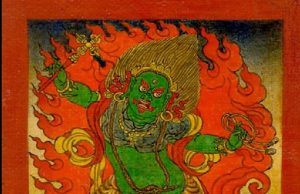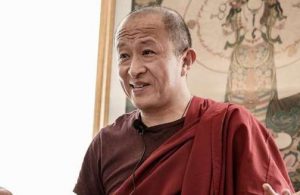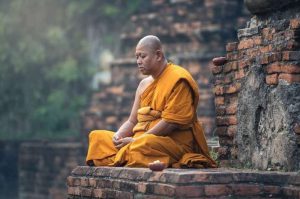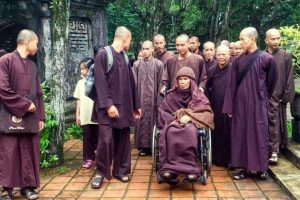There are many things one can reflect on and learn from viewing the movie named Karma, the story of which is centered on a nunnery located in the rugged mountains of Nepal. However, in this short review, I would like to share with you my personal feelings about two of the main characters. One is an older nun, Ani Tsewang, who takes charge of the nunnery after the chief abbess passes away. What impressed me was how carefully the film director handled her character right from the beginning of the story, through to the ending because there is much to be learned from her strength of character. She carries herself with a quiet dignity and grace, especially in her soothing words offered to the dying abbess, through to maintaining daily discipline and order amongst the younger nuns; and manages all with a wise calm authority and occasional humor.
My other favorite character is a younger nun named Ani Karma who is one of the 44 nuns in residence that practice a life of virtue in their rural seclusion. Ani Karma has the youthful exuberance that shows in her playful sense of fun, moderate attention to her recitation practice, yet all the while dutifully maintaining her responsibility of switching on the evening power to the buildings. In Buddhism, many of us believe that humor and spirituality go hand in hand together. Both of these characteristics can be found in Ani Karma because on the one hand she is very funny and knows how to enjoy any given situation, and on the other hand she can be a very responsible nun. Her character also likes to accept challenges in life, is prepared to face them, and does not give up hope easily. She displays all these traits of determination and bravery when she travels from her rural setting to increasingly larger towns/ cities in pursuit of money that the chief abbess had given to a businessman; and the nunnery then hopes to get back to pay for her death rituals.
During the film, Ani Karma and a fellow nun set out together on a journey in search of the money loaned to the man named Tashi who lives and conducts business (allegedly in “shady business dealings”) in one of the big cities and they must find him to collect the debt. Her travelling companion complains a lot and becomes discouraged and stops halfway along due to a foot injury and so Ani Karma bravely continues on alone in search of the much-needed cash for the nunnery and the funeral ceremonies to honor the dead abbess.
In the big city of Kathmandu, she finally encounters the elusive Tashi – whose ‘bad reputation’ proves to be honest and sincere in that he takes care of orphans and prostitutes. Ani Karma is so moved by this that instead of collecting the debt from Tashi, she leaves the money in the community because she witnesses his devotion to saving those who are miserable in society.
Today we find many people in our societies who give up challenges halfway, just like the travelling nun friend of Ani Karma. The other thing I like about her character is that she is very determined and brave and these qualities could be seen throughout the movie. Although Ani Karma is young in her age, I was taken by surprise by two of her wise decisions: firstly, after she had witnessed Tashi’s dedication to helping the disadvantaged in society, she carefully gave back the money so that he could continue helping these miserable people – orphans and prostitutes. She understood that the same money would be better used for the welfare of suffering beings rather than a big funeral ritual for the abbess. Secondly, soon after she returned to the nunnery and was appointed to the honored position of chief reciter, she took the wise decision instead to go for a meditation retreat to reflect more deeply on the meaning of life, and especially the purpose behind the compassionate acts of humans towards others in need.
Next we come back to discuss about the old nun, Ani Tsewang, who took charge of the nunnery after the chief abbess had passed away. The first and foremost quality I saw in her was wisdom, and with her calm qualities, she deserved to be the successor of the chief abbess. She tried every possible way to run the nunnery in the best manner within her capability. In fact, she sincerely did not want the other young nuns to feel the absence of the chief abbess. Also I liked the way she responded positively to Ani Karma when she requested to go for a retreat. She understood and agreed with the importance of this need for reflection. We also see and appreciate her deep understanding of Buddhism. When a young nun reported to her that they were running out of butter to keep 108 lamps burning, she very wisely said, “You don’t need 108 lamps! Just keep one big one burning… intent is most important.” There were many things to learn from her calm demeanor and wisdom in various situations.
So overall, I feel that we can learn many good and important qualities from these two characters in the film such as determination, a sense of responsibility, courage, the wisdom of thoughtfulness in decision making and so on. If each of us can learn to develop such qualities in our own day-to-day lives, then we have a better chance of building up a sustainable society to live in. Inspiring characters such as these two nuns can help us to strive for personal growth and connection with others.
















